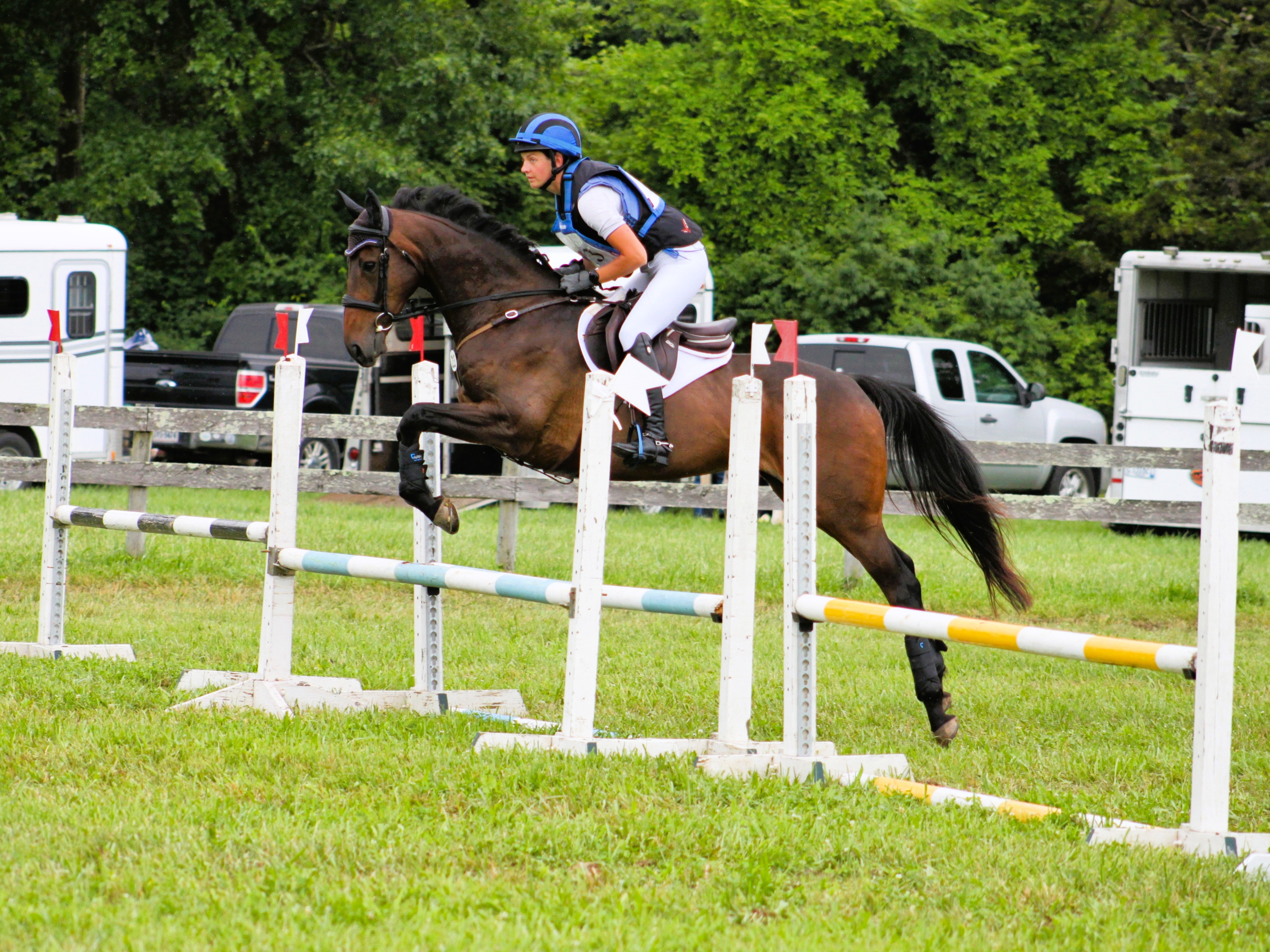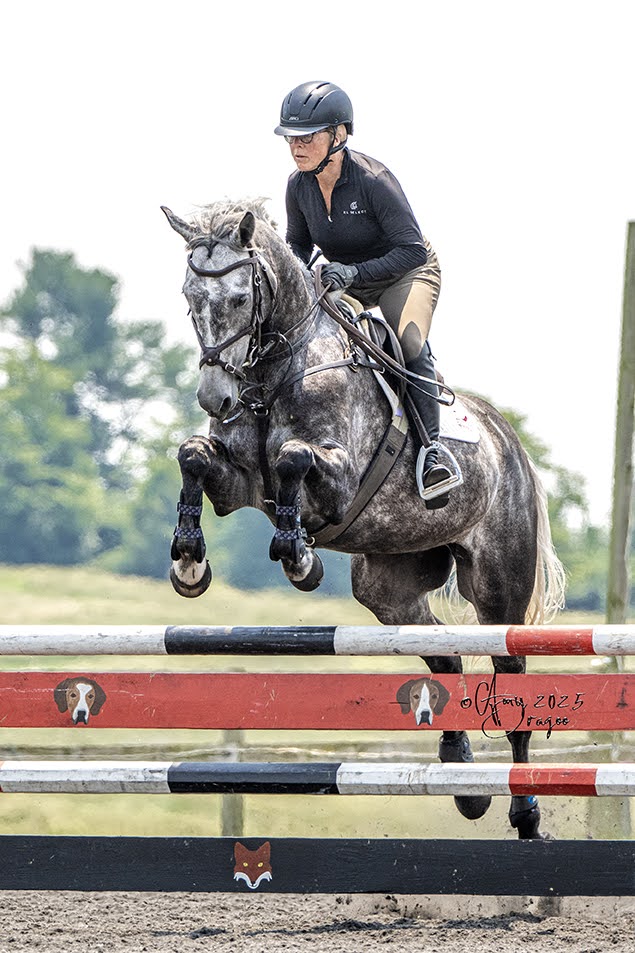In today’s world, it often feels like we’re viewing each other’s lives through the filter of a highlight reel. We see the perfect trips, the flawless jumps, and the moments polished enough for social media. What we rarely talk about is the pressure this creates for athletes on both sides of the screen.
Riders—whether professional or amateur—can feel an unspoken obligation to post content that makes them look successful and impressive. Meanwhile, as we scroll through these posts, it’s easy to fall into the trap of thinking the sport is all smooth sailing. This distorted perception can leave riders feeling as if they’re not succeeding all the time, they may not be cut out for the sport.
With Between the Ears, I want to peel back that facade and dive into the real, often unspoken challenges riders face in the eventing world. Through these conversations, we’ll explore what it truly means to navigate the ups and downs of the sport.
In this edition, I caught up with 4* rider Alex Conrad. Alex owns his own business, Conrad Equestrian, and focuses on lessons, sales, training, and competition. He recently moved his business to Cochranville, PA, where he has the opportunity to train out of Windurra USA alongside Boyd and Silva Martin. Alex produced his 4* horse, Malibu Preacher, through the levels after getting him off the track six years ago. He provides valuable insights into life in the industry, and his career is just getting started. So with that, let’s go between the ears…
[To read more Between the Ears interviews, click here]

Alex Conrad and Malibu Preacher. Photo by Shelby Allen.
Can you give me a little bit of a history of how you got into horses and grew your career in the industry?
I started riding when I was eight years old. I went to a friend’s house, and his sister had a horse in the backyard. She let me hop on bareback and led me around. I was playing soccer, hockey, and lacrosse at the time, but for some reason, I immediately fell in love with riding. I started taking lessons and eventually began working at the barn to get more opportunities to ride. By the time I was eleven, I was spending all my time there, riding and working as much as I could.
When I was fourteen or fifteen, I met Ann Getchell, who owns Groton House Farm in Hamilton, Massachusetts. She gave me opportunities to ride a variety of horses, which was an incredible experience. Groton House was an amazing facility with a lot going on, so I got a lot of exposure and learned a ton about the industry. I went on to have the opportunity to be a working student for Beth Perkins followed by Ashley McVaugh. While attending Boston University, I structured my class schedule so I could continue training and competing. I used to take classes on Tuesdays and Thursdays and take the train back and forth to ride, which was crazy but gave me a taste of what it takes to make it in the industry. After graduation, I worked for Ryan Wood for about three years before starting my own business in Area One. Recently, I made the big decision to move back to Pennsylvania and rent the schoolhouse at Boyd’s, which has been an amazing opportunity. I feel like I’m making so much progress from this seemingly risky move, and I’m so glad I took the chance to do it.
Was there ever a time that you lost confidence in your riding or competing? If so, how did you navigate and overcome it?
I can’t pinpoint one specific moment, but a lot of my career has been spent riding young or difficult horses, and that has tested my confidence at times. Early on I would sometimes get pressure from owners to compete horses at certain levels that maybe deep down I suspected they weren’t ready for but I convinced myself we could do it. This would sometimes lead to setbacks. I would also take on some very sharp or tricky horses. A lot of times, these situations were a byproduct of doing what I needed to do to move things along in my career or even just to make money. I always reminded myself that I love the sport. When I had tough falls or tough rides, I would take time to reassess and then kept practicing until I felt like myself again. Confidence ebbs and flows. I find it’s also dependent on the horses you have, and not all of them will be strong in all three phases of our sport, but I’ve learned to focus on what I can control and keep moving forward.
Have you experienced any difficulties with getting owners and people on board to help grow your career?

Alexander Conrad and Malibu Preacher. Photo by Sally Spickard.
It’s definitely nerve-wracking to ask for support. It takes confidence to believe that you’re deserving of it. I started by reaching out to people I had strong relationships with—clients I’d taught for years or friends who had horses with me. That made the conversations easier. Now, I have some fantastic owners who truly believe in me, and we celebrate the journey together. Instead of feeling pressure to perform for them, I feel supported by them. My owners are also friends, and I want them with me every step of the way, which is a very healthy situation for me. In the past, when I’ve been in different circumstances, I felt like the pressure to perform was a distraction. Now, with a team focused on the process and accepting of the ups and downs of the sport, I find myself free of that pressure.
What are some of the biggest obstacles you’ve faced in your career?
One of the biggest challenges was building my career without a financial safety net. Like many people, I had to work hard for every opportunity. I leased, borrowed or was given horses for the majority of my career. I didn’t own my first horse until I was 23, and he was an off-the-track Thoroughbred I brought up through intermediate. I’ve always had to make the most of the horses I had, and I think that’s made me a better rider.
My upper-level horse, Malibu Preacher, has been with me for six years, and it has been worth every second. I did my first FEI on him, my first Advanced, and my first 4*. It hasn’t been easy, but I think the accomplishments I do have mean that much more because of the journey we’ve had. A local Pennsylvania friend, Anne Hambleton, found him and he has been a horse of a lifetime.
I always go back to when I was 18 or 19, and it felt like everyone was getting ready to go to young riders and I was doing my first Beginner Novice. Then when I was working for Ryan as his rider, it felt like everyone, including the working students, had horses at the FEI level. On FEI weekends, the farm would be empty, and I would be at home because I didn’t have anything to compete at those levels. I used that as motivation: I told myself, “One day, it’s going to be my turn” and I made every ride count. I took the daily rides very seriously so when my time came, I would be ready to rise to the occasion. Now, at 33, I feel like I’ve put in the work to be here, and I’m ready for this next chapter.
Is there anything you do to help you feel more confident?
I was very close with my grandfather — we were inseparable growing up. When he passed away, he gave me his dog tags from World War II. When I compete, I always have them under my cross country vest and it always makes me feel safe. It’s a small thing, but it’s a source of comfort and confidence for me. I don’t think I’ve gone out on a course in the last 5 years without them, and I always feel protected and grounded.
I also have an incredible team of people who support me — my staff, owners, and friends. There are a few people in particular — Jackson Dillard, Brie Guinta, and Antonio Rodriguez — that I really like to have grooming at the bigger events. They are fantastic with the horses and have become close friends of mine. They are not only good at what they do, they are at a core level, good people. Surrounding yourself with good people makes all the difference in this sport. I wouldn’t be where I am today without them. It’s pretty cool to share some of these new milestones I am reaching with them. They have been through many ups and downs with me and it means a lot to see them at the finish line.
What advice would you give to someone facing adversity in the sport?

Alex Conrad and Bonito. Photo by Abby Powell.
Try to see the good in every situation. Even when something feels like a major setback, focus on your next move. Instead of dwelling on what’s happened, ask yourself, “How do I still get to my goal from here?” You have to accept the realities of where you are and control the controllables.
If you believe in yourself and stay committed to taking the next right step, you’ll find a way forward. Even after you have taken a few steps back, there is always a step forward!
Alex’s journey is a testament to perseverance, adaptability, and the power of believing in yourself even when the odds seem stacked against you. His story reminds us that success in this sport isn’t about how quickly you get there—it’s about how resilient you are along the way. Whether you’re bringing along an off-the-track Thoroughbred, building your career from the ground up, or simply pushing through self-doubt, there’s a lesson to be learned in every step. At the end of the day, the riders who thrive are the ones who embrace the challenges, surround themselves with the right people, and never stop striving for growth. Alex is a perfect example of that.




















